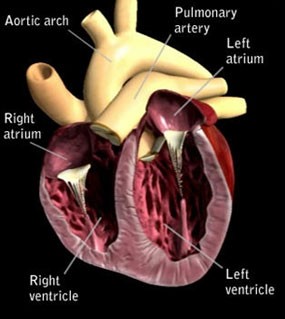
Overview/Description of Disease
The heart is a muscular pump which pushes blood around the entire body. In a normal dog it beats approximately 150,000 times a day. A muscle that works this hard needs to be in shape (with good muscle tone) to do its job effectively!
The heart is actually made up of two pumps because a dog's body, like ours, has two different circuits for blood flow, moving first through one and then the other. One of these circuits takes blood through the lungs so that oxygen can be replenished and waste gases, such as carbon dioxide, are removed. This oxygen-enriched blood then moves through the other circuit, reaching all parts of the body to deliver the oxygen needed for normal body function and removing waste products as needed.
Heart disease causes a disruption in circulation; blood is pumped less effectively, leading to poor blood supply to muscles and organs. Because muscles and organs need consistent blood supply to work correctly and stay healthy, heart disease can cause muscles and organs to atrophy and weaken.
There are several forms of heart disease that affect dogs, some of which affect the heart muscle itself and others which affect the heart valves. One of the most common forms of heart disease is dilated cardiomyopathy. Another common form is chronic valve disease (CVD).
Dogs are often at risk for certain types of heart disease depending on genetics, breed, age, and size. Breeds commonly affected include:
- Doberman Pinschers
- Cocker Spaniels
- Great Danes
- Irish Wolfhounds
- Boxers
- Poodles
- Pekingese
- Boston Terriers
Symptoms
While a dog's body is resilient and is able to adapt to heart disease early on, as the disease progresses, the heart's ability to function becomes so poor that symptoms of failure become easier to spot. Keep an eye on your pooch and make sure to call your veterinarian if he or she:
- Doesn't want to play or exercise
- Is tired or lethargic
- Has difficulty breathing or is coughing up fluid
- Collapses or faints
Diagnosis and Treatment
Valve disease is usually first identified when your veterinarian hears a murmur, caused because the valve has become leaky. Cardiomyopathy (heart muscle disease) may or may not cause a murmur so there may be no immediate signs for your veterinarian to identify. If they suspect heart disease, either because they hear a murmur or they are suspicious based on what you tell them, your veterinarian will typically recommend a number of tests to fully evaluate your pet’s heart and the effect that poor circulation is having on the rest or your pet’s organs.
These tests may include:
- A radiograph, commonly known as an X-ray
- A blood test for a cardiac biomarker called NT proBNP
- A chemistry and CBC profile to assess the state of all the organs
- A blood pressure test
- An ECG (electrocardiograph) to record your dog’s heart’s electrical action
- An echocardiogram to take a look at your pets heart structure and function using ultrasound
If your pet is diagnosed with heart disease your veterinarian may prescribe the following treatment:
- Nutritional modification, such as a low sodium diet or the addition of supplements such as carnitine
- Diuretics to help clear excess fluid from the lungs and other organs and tissues
- Drugs that relax blood vessels and make it easier for the heart to do its job as a pump
- Drugs that help the heart muscle function more effectively, giving additional strength to the pump
- Regular but controlled exercise daily once clinical signs have been controlled
- Drugs that do several of these things at the same time are available
Prevention
Unfortunately there isn’t much that can be done to prevent heart disease. Unlike in people, where lack of exercise and poor diet predispose us to heart problems, heart disease in our dogs usually will develop regardless of their lifestyle or diet. Of course keeping them in good body condition will help prevent a number of other serious diseases like diabetes. In some breeds heart disease is passed from generation to generation and so selective breeding programs may be of some benefit. Early recognition of the presence of the disease is very important, so that treatment can be started as soon as possible. Regular check ups by your veterinarian, at least once a year, are the best way to ensure the disease is caught and treated should your pet be unlucky enough to develop one of these heart problems.
If you have any questions or concerns, you should always visit or call your veterinarian – they are your best resource to ensure the health and well-being of your pets.
